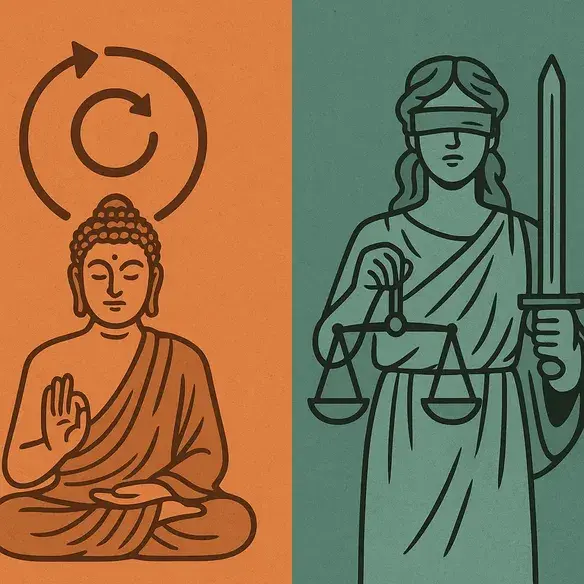Karma and Accountability — How Ancient Beliefs Align with Modern Ethics
The idea of karma—that every action has a consequence—is one of the most profound and enduring concepts in human thought. Rooted in the ancient philosophies of India, karma transcends religion and enters the realm of universal morality. In essence, karma teaches that what we think, say, and do creates energy that eventually returns to us, shaping our present and future. When examined through the lens of modern ethics, the principle of karma perfectly aligns with the contemporary understanding of accountability, justice, and personal responsibility.
The Essence of Karma
In Sanskrit, the word karma simply means “action.” Yet its spiritual meaning runs much deeper. Hindu, Buddhist, and Jain traditions describe karma as the law of moral causation—whatever we sow, we reap. Every good deed plants a seed of harmony and joy; every harmful act plants a seed of pain and imbalance. Unlike divine punishment, karma is not an external judgment—it is an inner law of balance that ensures moral order in the universe.
This concept also emphasizes intention. According to the Bhagavad Gita, it is not just the act that matters but the motive behind it. Acting selflessly and with awareness purifies karma, while acting with greed or hatred binds us to suffering. The idea is simple yet revolutionary: human beings are the architects of their destiny, not the victims of fate.
Karma as a Moral Law
In modern terms, karma is remarkably similar to the idea of accountability. In ethical philosophy, accountability means taking responsibility for one’s actions and their outcomes. This sense of responsibility forms the basis of moral integrity, social justice, and sustainable living.
Just as karma teaches that every action has consequences, modern ethics holds individuals and institutions accountable for their behavior. Whether it is a government official misusing power, a company harming the environment, or an individual spreading misinformation, all must face the results of their actions. Karma and accountability both insist that actions cannot be separated from their effects—truth will eventually reveal itself, and justice, in one form or another, will prevail.
The Psychological Dimension of Karma
Beyond spirituality and morality, karma also has a psychological dimension. Every action and thought shapes our character and mental state. When we act with honesty and kindness, we create inner peace; when we act out of anger or deceit, we create restlessness. In this way, karma operates not only as a cosmic law but also as a psychological truth—showing that morality and mental health are deeply interconnected.
Modern psychology confirms this ancient wisdom. Studies show that guilt, resentment, and dishonesty increase stress and depression, while compassion, forgiveness, and gratitude promote mental well-being. In this sense, the principle of karma resonates with modern ethics by linking moral behavior with emotional harmony.
Karma in Social and Global Contexts
In today’s interconnected world, the reach of our actions has expanded beyond personal circles. Social media posts can influence millions; corporate decisions can impact ecosystems; political choices can alter the lives of entire populations. Here, the idea of collective karma becomes significant.
When societies act unjustly—through discrimination, exploitation, or neglect—they create collective suffering. Climate change, for instance, can be seen as a form of global karma: decades of greed, pollution, and disregard for nature returning as environmental crisis. Similarly, social inequality and violence are the results of long-standing ethical imbalances.
Modern ethics demands the same awareness—recognizing that collective accountability is essential for global harmony. By adopting karmic awareness in decision-making, humanity can move toward more sustainable and compassionate systems.
The Intersection of Karma and Modern Justice
Karma differs from man-made justice in one key way: it operates beyond external judgment. While legal systems may punish or pardon, karma functions through the natural law of cause and effect. Yet both share a common moral foundation—the idea that actions must have consequences.
In modern governance and corporate culture, ethical accountability mirrors the karmic principle. Whistleblower protections, transparent reporting, and environmental regulations are modern expressions of karmic justice. They reinforce the belief that integrity and fairness must guide every sphere of life.
Personal Responsibility in the Age of Freedom
In the modern age, freedom is celebrated—but without responsibility, freedom loses meaning. Karma provides the spiritual counterbalance to modern liberty. It reminds us that while we are free to act, we are never free from the results of our actions.
This understanding fosters maturity. It encourages mindfulness in daily choices—what we consume, how we treat others, and how we use power. It teaches that change begins within: reforming society starts with reforming the self. Karma and accountability, though born in different eras, speak the same moral language. Both affirm that ethical living is not optional—it is the foundation of a just and peaceful world. Karma brings a spiritual dimension to responsibility, reminding us that every choice leaves a trace, not just in society but in the soul.
In today’s world of fast decisions and instant gratification, the timeless message of karma invites reflection: act with awareness, choose with compassion, and live with integrity. When humans align their actions with truth and empathy, they not only fulfill the ancient law of karma but also uphold the highest standards of modern ethics.
~Religion World Bureau










